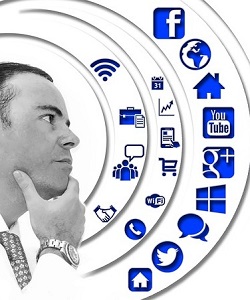
Technology has changed a lot in the past 20 years and it’s important for business owners to change with it.
However, there is always a need to use caution when deciding whether or not to adopt new technology.
Some things never become as popular as they were supposed to be (e.g. QR codes).
At other times some ideas take off but are then quickly replaced by something better (e.g. fax or pager marketing).
Some business owners still employ this type of caution when making a decision on social media, wondering if all the money they put into social media marketing will become useless in just a few years.
The time has come to abandon any worry that social media is just a flash-in-the-pan phenomenon. There is a lot of data that shows social media is a vital part of the way we communicate and engage with others and learn about new things.
Social media marketing is here to stay and furthermore, business owners should be elated about this new paradigm in marketing. Here’s why:
1. Building a Brand
The biggest benefit of social media marketing is that it’s one of the most effective ways to increase brand awareness and to improve public sentiment towards a brand. One study, What Makes Millennials Brand Loyal?, reported that 60 percent of U.S. millennials say social advertising has the most influence over how they perceive a brand.
Though this 2014 study focused on young adults specifically, it’s logical to assume that other age groups respond similarly to social media marketing and advertising. Building a brand is one of the toughest challenges a business faces and social media marketing makes it easier. This is something business owners should not want to see go away.
2. Instant Targeted Feedback
Engagement is a term thrown around a lot in discussions about brands and social media, but it’s more than just a buzzword. Being able to market a target audience and get instant, direct feedback is extremely beneficial for businesses.
This feature separates social media marketing from most other forms. While there are certainly some people who don’t want to engage with the brands and companies they frequently use, there are many people who do.
In the study mentioned before, 44 percent of U.S. millennials who responded to the survey said they wanted to have open dialogues with brands via social media. Being able to satisfy the portion of consumers who want to engage with a brand pays off in the long run as well.
Customers who shop with a brand over many years have a higher lifetime value than single shoppers. Social media is a way to encourage that long-term loyalty.
3. Better Customer Service
Customer service is another reason why social media marketing is here to stay. Businesses have to respond to customer issues in whatever format the customer chooses. If someone writes a letter with a legitimate concern or issue, the company reads the letter and responds.
So if people are asking questions and leaving comments on social media, then business owners need to use social media for that reason as well. Consumers are growing accustomed to being able to talk directly to their preferred companies and brands —that’s not going away.
Companies need to actively use and monitor social media to make sure they are providing good customer service to the people using their channels. As was mentioned above, what people see on social media affects how they feel about a brand.
4. Customers are the New Gatekeepers
Social media and blogs have also had a transformative effect on the way people digest news. Most people learn about news and issues from things posted by their friends.
Sometimes, this happens when someone directly posts a link to an article they find interesting, or it can happen when someone sees a posts talking about a topic and the reader looks for articles with more information.
People now scan Facebook, Google, and Twitter for news stories instead of thumbing through the local paper. There’s no reason to think this will change anytime soon. According to Nielsen, men and women agree that the growth of social media as a news source is more positive (78 percent) than negative (22 percent) development.
The news facet of social media is more important than many people realize. For generations, the content that people saw was chosen by the gatekeepers who chose what went in newspapers or in TV newscasts.
Social media lets people decide for themselves what they want to look at. For business owners, this creates a lot of opportunities to market their business, services, or events in a way that would have been impossible a decade ago.
Business owners no longer have to hope that the local newspaper runs their press release or buy expensive TV ads to reach the public. Social media gives marketers the ability to reach consumers directly with their content.
5. More Engaged Website Traffic
Social media also greatly expands the reach of the content on a business’s website. According to a report from ShareThis, people referred to websites from links on the social media networks LinkedIn, Google+, Facebook and Twitter spend more than two to three minutes on the site and visit two or more pages.
Interestingly, YouTube drives the most engaged traffic of all social media referrals, with the lowest average bounce rate (43.19 percent), the highest pages per visit (2.99), and the longest visit duration (227.82 seconds).
6. Increased Purchase Influence
Another way social media has changed the way we communicate is through the sharing of product news and information. In many ways, social media is becoming the default way that people learn about new things to buy.
One study stated that 29 percent of U.S. millennials say TV advertising is the medium most likely to introduce them to a new product, compared with 26 percent for social media, and 15 percent for mobile.
In other words, despite being one of the newest kids on the marketing block, social media is just as powerful as TV for reaching audiences with new products.
And once people learn about new products, they often go to social media to form their opinions on what they’ve seen commercials for. A study from Deloitte, a digital marketing firm, found that 75 percent of online Americans say product information found on social channels influences their shopping behavior and enhances brand loyalty.
7. Reach Difficult Demographics
Social media is also an ideal tool for reaching hard-to-target demographics like senior citizens. A recent study from Pew Research Center reported that more senior citizens are using social media (46 percent of online seniors and 27 percent of seniors in general).
The study also noted that seniors who are on social media socialize a lot more than their peers. Specifically, the researchers found 81 percent of seniors who use social networking sites say that they socialize with others on a daily or near-daily basis compared to 71 percent of seniors who are online and do not use social networking sites and 63 percent for seniors who are not online.
For marketers and business owners trying to reach senior citizens with new product information or news about a particular service or issue, communities of seniors who talk to one another and share articles they find interesting are an indispensable tool.
Since the majority of the baby boomer population uses social media, the importance of social media for reaching this particular demographic will grow as boomers enter retirement age.
8. Target Local Audiences
Similarly, social media is valuable for national retailers trying to reach local audiences. Recent data suggests that most national businesses find social media useful in this regard. BIA Kesley, an advertiser specializing in local advertising, reported that 57.9 percent of national businesses use Facebook pages for local promotions.
This shows that for retailers, the benefits of social aren’t limited to online shoppers. Social media drives consumer behavior online and off. According to another Deloitte study, digital channels will influence nearly half of all U.S. in-store retail sales by September of this year.
9. Part of Our Culture Now
The point of all of this is to illustrate the simple truth that social media has become an indispensable part of modern culture. People have grown accustomed to the benefits of using social media in their private, public and professional lives and there’s no way to turn the clock back on that.
The individual social networks may come and go (though people should be prepared to see Facebook for generations to come), but the idea of social media and communicating through web networks will not.
More importantly, there is no reason why business owners should want to see social media go away. Social media provides a platform that can be used to reach large numbers of consumers relatively cheaply.
10. Leveling the Playing Field
In a sense, social media levels the playing field for small businesses trying to market to consumers. The cost of using traditional marketing channels are so high that it’s difficult for small business owners to find a place to make their case to the public.
Social media allows business owner to market directly to their target audiences and the quality of the message determines how far it spreads (though there are ways to use paid promotion to boost the reach on most networks).
Social media marketing is here to stay, and business owners should be happy about it. With that settled, the next question business owners should be asking is how can they maximize the benefit they get from their social media channels.
(Photo by geralt / CC0 Public Domain )






Discussion